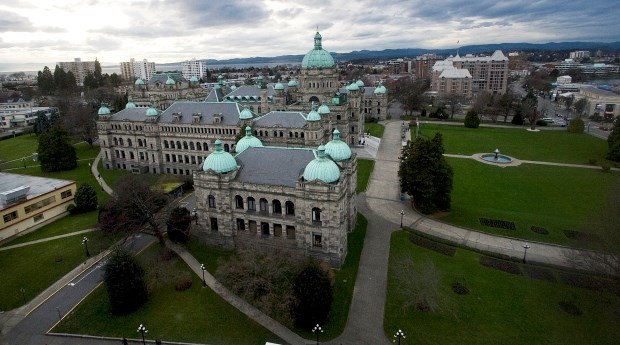 Change-of-government budgets in B.C. have gone in different directions over the years, but the swing is usually dramatic.
Change-of-government budgets in B.C. have gone in different directions over the years, but the swing is usually dramatic.
New governments have gone on massive spending blitzes, or imposed drastic austerity programs with their first budgets after taking power. Some have increased taxes across the board, others slashed them substantially.
The course changes have gone in various directions, but they’re usually markedly different from their predecessors’. The theme seems to be: Go big out of the gate, because it never gets easier to make changes in subsequent budgets.
Finance Minister Carole James is scheduled to deliver the first full budget of the NDP government this afternoon, following the amended update last September. If it follows the historic pattern, the spending plan will be markedly different from previous ones.
Normally, a minority government with just a two-seat edge and minimal representation through much of the province would be cautious when it comes to shake-ups. But the fact it’s the first NDP budget since 2000 means there’s a big accumulation of pent-up pressure to make major changes.
Most of them will be around the theme of making life more affordable. Although the NDP has started pleading for more time to fulfil some of its more expensive promises, the signals have been clear that B.C. will start moving in a new direction today.
Following is a brief rundown of some of the first budgets introduced by new governments over the years:
1973 — Former NDP premier Dave Barrett, whose death Feb. 2 prompted a round of fond memories within government, also acted as finance minister and introduced three budgets. Even before the first one, his government had set a guaranteed income for seniors and raised the minimum wage (to $2 an hour).
Riding a buoyant economy, he proudly outlined a plan for “the largest single-year spending increase” in B.C. history. “Areas of neglect” and “shortfalls of the past” left by the Social Credit regime were duly noted. He promised to balance budgets “whenever possible” and raised corporate taxes to meet that promise.
All the accomplishments he’s noted for cost money, and the provincial budget almost doubled, to $2 billion a year, early in his term. It’s more than $50 billion today.
1976 — When the Socreds regained power, they took over with a budget speech that tried to dismantle any idea that the NDP were good at managing government. They ordered up a report that found the last NDP budget was hopelessly in the red. The finding prompted them to raise personal and corporate income taxes and raise the sales tax two points, to seven per cent. Déjà vu abounds reading the speech, as it’s full of references to the debt crisis at ICBC.
1992 — The NDP regained power after the Socreds lasted 16 years under three different leaders. Their first budget copied the 1970s manoeuvre, with a finding that the Socred-induced deficit was three times higher than claimed. So tax hikes were again the order of the day, with income surtaxes, and corporate and small business tax hikes.
1996 — There was a change of leaders, not government, by 1996, and the budget speech shortly before an election campaign guaranteed a balanced budget. Then-premier Glen Clark won the election, but the government admitted months later it was hundreds of millions in the red, which started a furor that lasted much of his term.
2001 — The B.C. Liberals took over, and even before the budget, they announced a dramatic 25 per cent cut in personal income taxes. The budget speech later included the obligatory finding that the previous government had cooked the books and the deficit was once again out of control. The core review, mass staff buyouts and curtailment of services began soon after.
Today’s budget represents the fifth change of government in 45 years. The stress on affordability rules out tax hikes on most people, although corporations and high-income earners are targets. The officially certified surplus last year means James is limited to ICBC and B.C. Hydro when claiming deficits were hidden.
But the NDP’s major promises are all on the record, and today is the best chance the NDP will have to act on them.



